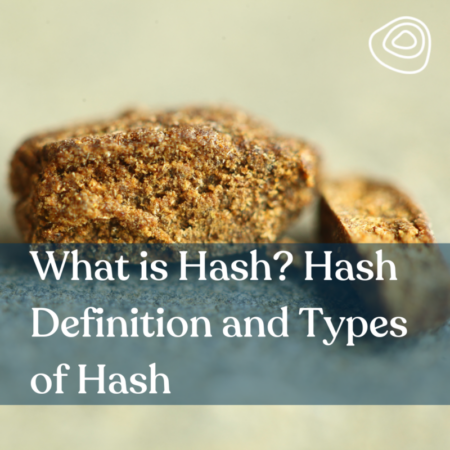- Locations
-
-
O’Fallon
MenuO’Fallon
1172 W. Terra LaneHazelwood
MenuHazelwood
7766 N. LindberghCreve Coeur
MenuCreve Coeur
11062A Olive Blvd.Springfield
MenuSpringfield
850 E. KearneyPlainfield, IL
MenuPlainfield, IL
16020 Illinois Rte 59Grayville, IL
MenuGrayville, IL
105 Koehler St.Dixon, IL
Coming SoonDixon, IL
1679 S. Galena Ave
-
-
- Get Your Medical Card
- Our Story
- Careers
- Resources
-
-
Get Your Medical Card
-
The Explorers Club
-
Events
-
-
-
Education
What is Hash? Hash Definition and Types of Hash

Are you wanting to know what is hash because you’re curious about the potent cannabis concentrate but don’t know where to start? Hash, also called hashish, has been around for centuries, with its origins traced back to ancient civilizations in the Middle East and Asia. The process of making hashish involves isolating the resinous trichomes from cannabis flowers, resulting in a highly concentrated product with a unique texture and flavor.
Unlike other cannabis products, hash is known for its powerful effects that can range from mellow relaxation to intense euphoria. Hash has a fascinating history, including the origins of making hashish, the different types of hash available, and how hash is consumed. Now that you can legally obtain hash in states where cannabis is legal, we’re bringing you the ultimate guide to understanding everything you need to know about hash.
What is Hashish or “Hash”
Hash Definition: Hash – /ha-sh/ – is a concentrated form of cannabis made by extracting the resinous trichomes from cannabis flowers and compressing them into blocks or balls.
Traditional hashish is popular among cannabis consumers due to its higher-than-average THC (tetrahydrocannabinol) levels, which can result in an intense high. The origins of the name “hash” come from the Arabic word “hashish,” meaning “grass,”. Production of the resin was traditionally done by rubbing the cannabis flowers between one’s hands, causing the sticky trichomes to stick to the hands like grass. Today, hash is produced using sieves or other tools to separate the trichomes. It can be smoked like marijuana or added to food or drinks for ingestion.
Types of Hash
Apart from the traditional form of hash, which is made by pressing the extracted resin into a solid mass, there are several other types of hash available that differ in the way they are produced and their potency. Here are three popular types of hash:
Bubble Hash – This type of hash is made using ice water and a micron filter bag to separate the trichomes from the cannabis plant. The result is a sifted material that is then dried and pressed into a block or ball. Bubble hash has a lightly colored appearance and a smooth texture, making it a high-grade cannabis concentrate. It is known for its potent and long-lasting effects, which can range from relaxing to euphoric.
Dry Sift Hash – Dry sift hash is similar to bubble hash in many ways, except that it does not require water. Instead, it involves using a special mesh or screen to sift the trichomes from the cannabis flowers. The resulting hash has a sand-like consistency and a light, golden or yellow color. Dry sift hash is one of the most potent types of hash, with higher THC levels than other forms of cannabis. It is known for its energetic and uplifting effects.
Lebanese Hash – This type of hash is made using a traditional method of hand-rolling cannabis flowers to extract the resinous trichomes. The resulting hash is typically brown or black, with a firm texture that can be crumbled easily. Lebanese hash is less potent than bubble hash or dry sift hash, but it still offers a strong, relaxing high that can last for several hours.
Overall, the potency and effects of different types of hash can vary widely depending on how they are made and the cannabis strain used. However, all forms of hash tend to have higher THC levels than marijuana buds, making them a favorite among cannabis consumers seeking a more intense high.
What is Hash Oil?
Hash oil, also known as cannabis oil or hashish oil, is a type of cannabis concentrate that is made by extracting the resinous trichomes from cannabis flowers using a solvent such as butane, propane, or ethanol. The result is a sticky, tar-like substance that has a high concentration of THC. Hash oil is often referred to as “dab” because it is usually consumed by vaporizing or “dabbing” a small amount of the oil on a hot surface and inhaling the resulting vapors.
Unlike other forms of cannabis concentrates, such as traditional hashish, bubble hashish, or dry sift hashish, hashish oil is typically a dark amber color and has a more liquid-like consistency. It is often made using high-quality cannabis strains and can have THC levels as high as 80-90%. Due to its potency, using hashish oil can result in a fast and intense high that can last for several hours.
Is Hash Oil Legal?
Whether hash oil is legal or not depends on the legality of cannabis in your state. In states where cannabis is legal for medical or recreational use, hash oil is also legal, but it is still illegal under federal law.
Laws regarding cannabis and its derivatives like hashish oil are constantly evolving in many states. While some states have legalized cannabis completely, allowing the production and sale of hash oil, others still have restrictions on the consumption or production of cannabis, including hashish oil. In some cases, possession of hash oil, even in small quantities, can result in serious criminal charges. It is essential to check your state’s laws and regulations regarding the use, production, or distribution of hashish oil.
Hash Effects
Hash effects can vary widely depending on the potency, dose, and user tolerance level.
Potential positive effects of hash:
- – Increased relaxation
- – Enhanced creativity and focus
- – Euphoria and mood lift
- – Altered sensory perception, such as heightened senses of taste, smell, and touch
- – Relief from pain and anxiety
- – Reduced inflammation and nausea
- – Improved sleep quality
Negative or neutral hash effects:
- – Dry mouth
- – Dry eyes
- – Dizziness or lightheadedness
- – Increased heart rate and blood pressure
- – Paranoia or anxiety in some individuals, particularly with higher doses or high-potency hashish
- – Couch-lock, sedation, or sleepiness
The effects of hashish can last for several hours, ranging from two to six hours, depending on the dose and method of consumption. We recommend that those who are new to cannabis or have a low tolerance consume hashish in moderation until they get used to the effects of hash.
How is Hashish Made?
Hashish is made by extracting trichomes, the resinous glands from the flowers of the cannabis plant, and compressing them into solid blocks or balls. The most traditional method of making hashish involves rubbing the flowers between one’s hands or using a flat surface to extract the resin, which is known as hand-rubbed hashish or charas.
Ice water and a micron filter bag can also be used to separate the trichomes to create bubble hashish. Dry sifting, which is sieving through screens to separate the trichomes, is yet another popular hashish-making method. Modern production techniques use chemical solvents like butane and CO2 to extract the trichomes, resulting in hashish oil.
What is Hashish Made From?
Hashish is made from a variety of cannabis strains and it is specifically their trichomes that are used in its production. These trichomes contain cannabinoids such as THC (tetrahydrocannabinol), CBD (cannabidiol), and CBN (cannabinol). The potency and effects of different types of hashish depend on which strain was used as well as how it was processed.
Making Hashish
The process for making hashish can vary depending on which method is employed. However, most processes for making hashish involve isolating the trichomes from the cannabis flower before compressing them into solid blocks or balls. In some cases, these blocks are then smoked whilst other times they may be eaten or dissolved in teas and tinctures.
Shop Our Dispensary Near Me Menus
Check out our Illinois Dispensary Near Me Menu! Grayville
Check out our Missouri Dispensary Near Me Menus! O’Fallon, Creve Coeur, Hazelwood and Springfield


